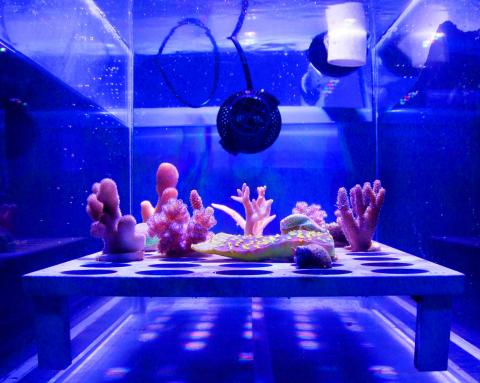An ultra-fine biodegradable film about 50,000 times thinner than a human hair could be enlisted to protect the Great Barrier Reef from environmental degradation, researchers said yesterday.
The UNESCO World Heritage-listed site, which attracts millions of tourists each year, is reeling from significant bouts of coral bleaching due to warming sea temperatures linked to climate change.
Scientists from the Australian Institute of Marine Science have been buoyed by test results of a floating “sun shield” made of calcium carbonate that has been shown to protect the reef from the effects of bleaching.

Photo: AFP
“It’s designed to sit on the surface of the water above the corals, rather than directly on the corals, to provide an effective barrier against the sun,” Great Barrier Reef Foundation managing director Anna Marsden said.
The trials on seven different coral types found that the protective layer decreased bleaching of most species, cutting off sunlight by up to 30 percent.
“It created an opportunity to test the idea that by reducing the amount of sunlight from reaching the corals in the first place, we can prevent them from becoming stressed, which leads to bleaching,” Marsden said.
Researchers from a breadth of disciplines contributed to the project, which was headed by the scientist who developed the country’s polymer banknotes.
“In this case, we had chemical engineers and experts in polymer science working with marine ecologists and coral experts to bring this innovation to life,” Marsden said.
With its heavy use of coal-fired power and relatively small population, Australia is considered one of the world’s worst per capita greenhouse gas polluters, with advocates urging Canberra to do more to protect the environment.
The reef is also under threat from predatory coral-eating crown-of-thorns starfish, as well as farming runoff.
Marsden said it was impractical to suggest that the “sun shield” — made from the same material found in coral skeletons — could cover the entire 348,000km2 reef.
“But it could be deployed on a smaller, local level to protect high-value or high-risk areas of reef,” she added. “The concept needs more work and testing before it gets to that stage, but it’s an exciting development at a time when we need to explore all possible options to ensure we have a Great Barrier Reef for future generations.”
Hard corals, also called reef-building corals, produce a rock-like skeleton made of the same material as classroom chalk — calcium carbonate. Soft corals produce smaller amounts of calcium carbonate.
A report last year from Deloitte Access Economics valued the Great Barrier Reef as an asset worth A$56 billion (US$43 billion), which included its tourism revenues and indirect value for people who have not yet visited the site, but know it exists.

The collapse of the Swiss Birch glacier serves as a chilling warning of the escalating dangers faced by communities worldwide living under the shadow of fragile ice, particularly in Asia, experts said. Footage of the collapse on Wednesday showed a huge cloud of ice and rubble hurtling down the mountainside into the hamlet of Blatten. Swiss Development Cooperation disaster risk reduction adviser Ali Neumann said that while the role of climate change in the case of Blatten “still needs to be investigated,” the wider impacts were clear on the cryosphere — the part of the world covered by frozen water. “Climate change and

Poland is set to hold a presidential runoff election today between two candidates offering starkly different visions for the country’s future. The winner would succeed Polish President Andrzej Duda, a conservative who is finishing his second and final term. The outcome would determine whether Poland embraces a nationalist populist trajectory or pivots more fully toward liberal, pro-European policies. An exit poll by Ipsos would be released when polls close today at 9pm local time, with a margin of error of plus or minus 2 percentage points. Final results are expected tomorrow. Whoever wins can be expected to either help or hinder the

Packed crowds in India celebrating their cricket team’s victory ended in a deadly stampede on Wednesday, with 11 mainly young fans crushed to death, the local state’s chief minister said. Joyous cricket fans had come out to celebrate and welcome home their heroes, Royal Challengers Bengaluru, after they beat Punjab Kings in a roller-coaster Indian Premier League (IPL) cricket final on Tuesday night. However, the euphoria of the vast crowds in the southern tech city of Bengaluru ended in disaster, with Indian Prime Minister Narendra calling it “absolutely heartrending.” Karnataka Chief Minister Siddaramaiah said most of the deceased are young, with 11 dead

DENIAL: Musk said that the ‘New York Times was lying their ass off,’ after it reported he used so much drugs that he developed bladder problems Elon Musk on Saturday denied a report that he used ketamine and other drugs extensively last year on the US presidential campaign trail. The New York Times on Friday reported that the billionaire adviser to US President Donald Trump used so much ketamine, a powerful anesthetic, that he developed bladder problems. The newspaper said the world’s richest person also took ecstasy and mushrooms, and traveled with a pill box last year, adding that it was not known whether Musk also took drugs while heading the so-called US Department of Government Efficiency (DOGE) after Trump took power in January. In a